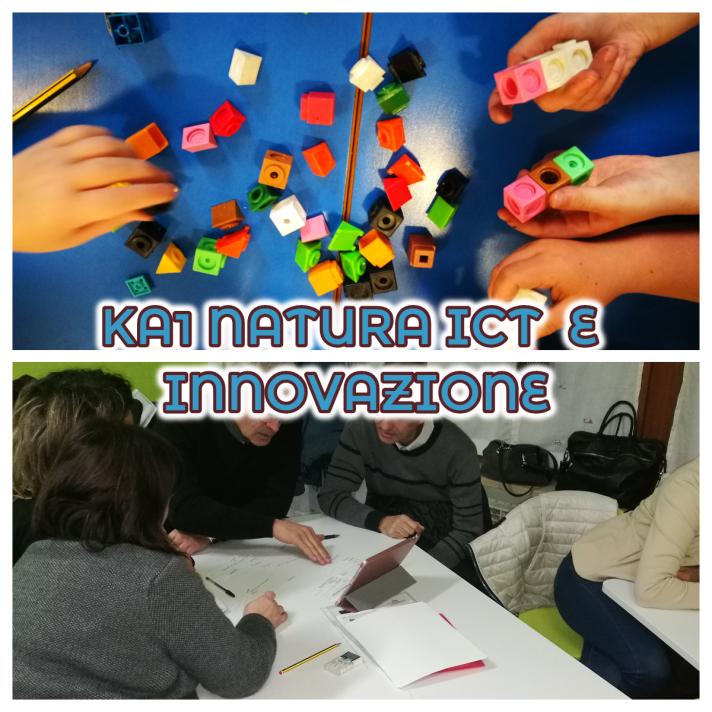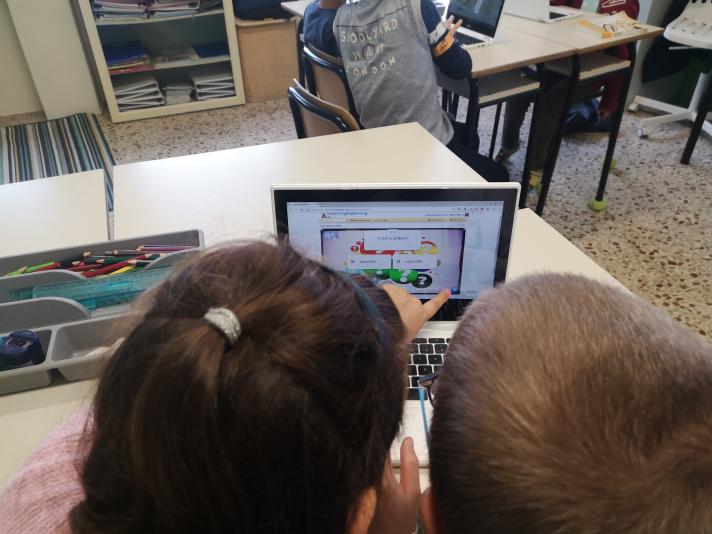Topic(s) addressed
The main objectives of the project’s training activities were fundamentally focused on supporting a strong renewal, provide for a student-centred approach, and the development of a competencies-oriented school. To this end, our project’s aims were to promote a European sense of belonging as a part of a wider community; stimulate long-impact methodological innovation; increase the level of digital integration across different disciplines; promote environmental awareness and a love of nature; bring the disciplines outdoors; renew and use different and inclusive learning environments; and, to increase participants’ language skills. The project’s goals were linked to the Teaching Award’s annual priority as it promoted a holistic systemic integration of ICTs; a general methodological renewal towards active and inclusive methods that were to be integrated into different disciplines; the frequent use of Outdoor Learning; a more active role among students for their learning processes; an increased ability for teachers to share and communicate; and, a renewed role for our school in its surrounding areas (with the school to be seen as a reference point).
Target groups
The project’s target group for the mobility consisted of 21 teachers from 3 levels (kindergarten, primary, and secondary education), as well as the school’s principal. Staff who were involved in both courses and job-shadowing exercises were put into contact with teachers from 7 different countries, with all teachers frequently involved in dissemination workshops.
Methodologies
When we began with the Erasmus pathway, it was decided that we begin by identifying our real needs; the strongest need was that of methodological renewal, as no real change could be affected without the use of a new approach. To that end, teachers attended courses and job-shadowing exercises on the integration of ICTs into disciplines, as well as active and innovative methodologies for 21st-century skills such as PBL, cooperative learning, IBL, accelerated reading, and creative and critical thinking. Furthermore, participating teachers were exposed to innovative methodologies integrated with ICT; experimental teaching, innovative practices, and inclusive methods; outdoor learning; and, environmental awareness. The constant and periodical dissemination of activities connected participants with the PNSD (the national school plan for digitalisation) and the PTFD (the 3-year plan for teacher training), both of which allowed them to widen the impact of learning outcomes and a gradual shift in the school’s vision. In addition to an increase in the innovative use of tools over the years, the project had also successfully created a link between the school’s formal, non-formal, and informal education teaching practices, with many multidisciplinary projects having been developed as a result of the acquisition of new methods.
Environments
Changing the school’s teaching methods resulted in a direct change of its learning environment, with the use of innovative methods requiring a group- based setting or, at the very least, a change in the class setting. In the end, many classes adopted both measures, with the group-based setting becoming the norm – particularly at the primary school. Moreover, thanks to PNSD funds and the contribution of several local stakeholders who were interested in our path to Europeanization, we created other special environments that includes an innovative digital library (Biblòh); a language hub; and the ‘gre-en lab’; furthermore, we began using corridors in a creative manner: https://spark.adobe.com/page/TybWePppFHxbj/. All these environments were built using an innovative and European concept, as seen and experienced in various European countries during the project’s duration. In addition to making the outdoors an everyday learning environment, we also led several courses for other colleagues beyond the school’s region in order to spread awareness on the effectiveness of outdoor learning. The outdoors learning approach that was learnt during the project was also the base on an eTwinning project: Little Schools Outdoors, which won the National Prize. Finally, the use of the digital environment, both GSuite and many other general Webtools, have since become a norm for most of our teachers, with all of the school’s different primary and kindergarten classes having their own blogs where they document all of their innovative practices.
Teachers
Initially, getting teachers to participate in mobilities proved challenging, as this was our first Erasmus project and several teachers were anxious at the thought of traveling to a country where they had to communicate in a language that they did not often use. Although we activated English courses, several of them nevertheless required expert teachers as companions; despite this, our teachers gradually learnt a lot – including those who did not travel but instead participated in active dissemination processes. Having connected the project to other national actions such as PNSD and PTFD, most teachers experimented with at least some of the acquired methods, with ICT practice becoming a daily affair. New methods that were implemented in class brought a new perspective towards education, with new experiences connected to innovation becoming markedly common experiences. Some teachers also opened their class for internal job-shadowing exercises and supported colleagues in the implementation of new methods and in peer-to-peer relations. In particular, at the Primary School of Travo, the school incorporated active methods that were digitally integrated, student-centred, and competencies oriented into their entire school system, with new staff arriving into the school required to adapt to said developments. In conclusion, the level of expertise among many of our teachers has substantially improved, especially in instructional strategies, ICT integration, and active didactics. Furthermore, due to several internal and external dissemination workshops, teachers have also considerably increased their storytelling competence and communicative skills – including in public speaking.
Impact
This was our first Erasmus Project and it was the beginning of a long pathway to Europeanization that remains active, strong, and systemic. We selected real key needs that needed to be worked on, and their successful attainment has provided the school with a solid foundation for all of its innovation processes, with Europeanization still forming the core of our school’s plans and development. For a small school such as ours, which is part of an umbrella organisation with 14 other small schools along a 70-km stretch of road (consisting of kindergarten to secondary schools), such systems are not always easily developed. Despite this, the school’s approach continues to experience radical changes, with the system created in only one school now inspiring other small schools; furthermore, even the most traditional teachers from said schools are attempting to change their teaching processes. We continue to pursue our Erasmus pathway and we have since participated in a number of other KA1 and KA2 projects, for which we are currently in the accreditation phase. In sum, we have now become a landmark institution for the region’s small schools.
- Reference
- 2016-1-IT02-KA101-023125
- Project locations
- Italy
- Project category
- Primary education
- Project year
- 2021
Stakeholders
Participants
CEIP Paula Soler Sanchiz
- Address
- Spain
Ecole Communale d'Arquennes
- Address
- Belgium
Lander Road Primary School
- Address
- United Kingdom
Onkilahden koulu
- Address
- Finland


